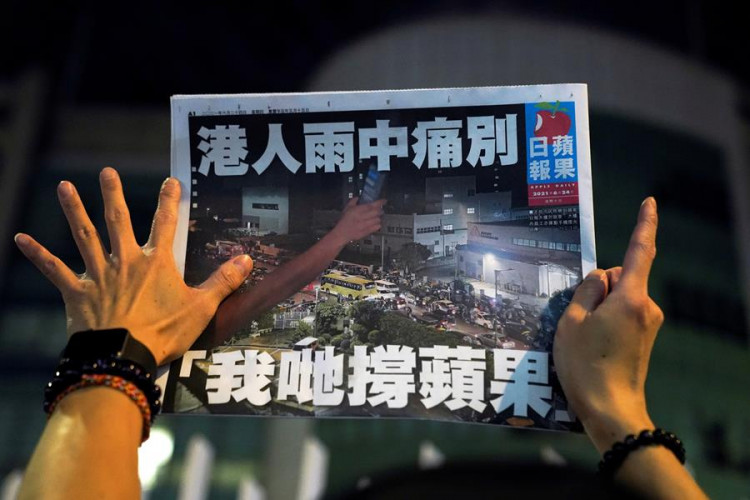People across Hong Kong lined up early Thursday to buy the final print edition of the Apple Daily newspaper, forced to shut by authorities who claimed it violated the national security law.
Some 1 million copies - up from the average 80,000 - of the last remaining pro-democracy newspaper were sold out across most of the international financial hub's newsstands by 8:30 a.m., ending 26 years of journalism.
More than 100 people stood outside Apple Daily's office building in the rain Wednesday night to show their support.
Inside the newsroom, staff took group photos while some wept as they put together the last edition of the newspaper. Journalists from rival outlets were there to chronicle a significant moment for their industry.
Apple Daily, which is majority owned by jailed China critic Jimmy Lai, has come under pressure from Hong Kong authorities.
In the past week, authorities seized journalists' computers, froze Apple Daily's assets and charged two of the company's top executives under a national security legislation enforced by China in 2020 to suppress dissent in the city.
Unable to pay employees and operating costs, Apple Daily announced it would shut down on midnight Wednesday.
Some of the hundreds of journalists and reporters had quit in recent days and weeks, fearing for their safety and the dangerous position of the company.
Media rights organizations condemned Hong Kong's actions Wednesday.
"The era of free political speech as we have long known it is gone," Sharron Fast, a journalism lecturer at the University of Hong Kong, said in quotes by The Wall Street Journal.
The newspaper's demise was "shocking but not surprising," Keith Richburg, the chief of Hong Kong University's journalism and media studies, said.
Here are some comments from Hong Kong locals and others in reaction to Apple Daily's shutdown:
"There's no press freedom in Hong Kong...I cannot see any future in Hong Kong," Dickson Ng, 51, Apple Daily designer, said.
"The forced closure of Apple Daily is the blackest day for media freedom in Hong Kong's recent history," according to Yamini Mishra, Amnesty International Asia-Pacific Regional Director
"The closure of Apple Daily clearly shows how the National Security Law imposed by Beijing is being used to stifle freedom of the press and the free expression of opinions," the European Union in Hong Kong said.
Meanwhile, China's nationalistic Global Times paper was happy about the closure of what it calls "secessionist tabloid."
Hong Kong Chief Executive Carrie Lam denied the Apple Daily case was an attack on press freedom.
"What we're dealing with is neither a news outlet problem nor a news reporting problem. It's a suspicious act of endangering national security," Lam said.
Apple Daily's closure marks a "dark day for press freedom in Hong Kong," Thomas Kellogg, executive director of the Georgetown Center for Asian Law, said, according to The Associated Press.
"Hong Kongers bid a painful farewell in the rain: 'We support Apple Daily,'" read the paper's final front page headline.





